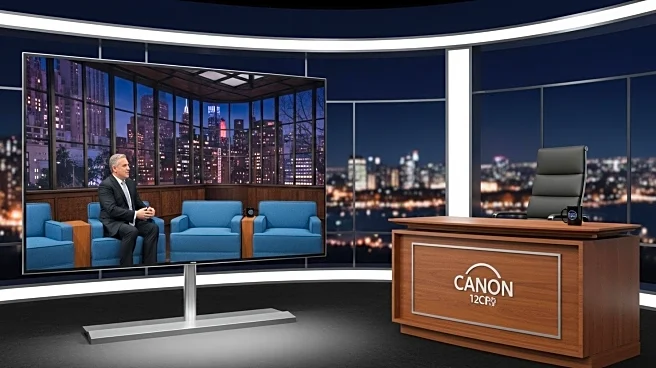What's Happening?
Sinclair Broadcast Group and Nexstar Media Group have announced the resumption of airing 'Jimmy Kimmel Live!' on their ABC affiliate stations starting September 26. The decision follows a period of preemption due to controversial remarks made by Kimmel regarding the fatal shooting of conservative activist Charlie Kirk. Sinclair and Nexstar had initially refused to air the show despite Disney and ABC lifting Kimmel's suspension. Sinclair stated that their decision was independent of any government influence and emphasized their commitment to providing programming that serves community interests while honoring national network obligations. Nexstar echoed similar sentiments, highlighting their dedication to fact-based and unbiased content.
Why It's Important?
The resumption of 'Jimmy Kimmel Live!' on Sinclair and Nexstar stations is significant as it underscores the ongoing debate over free speech and broadcasting rights in the U.S. The controversy surrounding Kimmel's comments and the subsequent suspension raised concerns about potential government influence on media content. The decision by Sinclair and Nexstar to resume airing the show reflects the complex balance broadcasters must maintain between community standards and national programming obligations. This development may impact public perception of media freedom and influence future broadcasting decisions, especially in politically charged contexts.
What's Next?
As 'Jimmy Kimmel Live!' returns to air, stakeholders including Disney, Sinclair, and Nexstar may continue discussions on content accountability and viewer feedback mechanisms. The situation could prompt further scrutiny from political leaders and advocacy groups regarding media freedom and broadcaster responsibilities. Nexstar's ongoing merger negotiations with Tegna may also be influenced by the resolution of this issue, as regulatory approval processes consider the implications of media consolidation on content diversity and free speech.
Beyond the Headlines
The controversy surrounding Jimmy Kimmel's comments and the subsequent broadcasting decisions highlight broader ethical and cultural dimensions in media. The incident raises questions about the role of broadcasters in moderating content and the potential impact of political pressures on media freedom. It also reflects the challenges of navigating public sentiment and advertiser interests in a polarized political environment, potentially influencing long-term shifts in media practices and policies.











